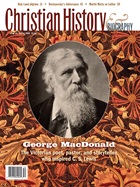"A preacher he is to the backbone." "To talk or write is with Mr. MacDonald necessarily to preach." These statements, taken from articles published in the 1860s and '70s, are fitting descriptions of a man whose formal ministry was brief but whose interest in preaching and religious teaching continued throughout his life.
MacDonald began to sense a call to ministry in the mid-1840s, shortly after receiving his degree from King's College in Aberdeen. He became minister of Trinity Congregational Church in Arundel, Sussex, in 1850, but the universalist beliefs that had emerged during his studies at King's soon became distasteful to his congregation. Unwilling to be the cause of schism or strife, he agreed to resign after serving only three years.
He did not, however, abandon his calling. He spent some time with an informal congregation in a rented room in Manchester, and was often invited to preach in churches throughout England and Scotland.
MacDonald's doctrine and career path were a bit unconventional, but in many other respects he was very much in the mainstream of Victorian preaching. During the 19th century, there was a lively debate over whether sermons should be read from manuscript or delivered extemporaneously. Like Charles Spurgeon and a host of other preachers, MacDonald came down firmly on the "extemporaneous" side. He used only notes in the pulpit, with stenographers helping to prepare transcripts for publication in religious magazines on both sides of the Atlantic. He also followed the common practice of publishing several books of sermons, which often included works he never had the opportunity to preach.
The importance of being earnest
Both the sermons he preached and those he published met the 19th-century criteria for good preaching. First, the Victorians wanted their preachers to be "earnest," a term they used to describe sincerely Christian men who could communicate a sense of moral authority to their congregations. An article published in the Spectator in 1901 gives a good sense of MacDonald's charisma in the pulpit:
He told his hearers of what he knew. [His sermon] was no piece of brocaded oratory, no set theological essay, it was a simple yet most profound message from a human soul to his brother souls. Here was one, you felt, who had been on the Mount of Vision and who had seen and heard things beyond mortal ken. You forgot mere logic, you were rapt into an "ampler ether, a sublimer air" than you were wont to breathe every day.
Earnestness is, of course, best expressed in person, but MacDonald apparently managed to convey it through the printed page as well. One critic praised some of his Unspoken Sermons as "arresting and illuminating," and another noted that while his books could not capture the full force of his "striking personality," those who read his sermons would get at least some sense of his "searching spiritual power."
"If we are not practical, we are nothing"
Being earnest was important, but it was not enough. Once preachers had captured their congregants' attention, they were expected to show them how to live sincere Christian lives of their own. The Victorians regarded practical application as the single most important element of preaching. A talk could be on a religious subject, and it could even be delivered from a pulpit, but if it did not offer clear and specific instructions for holy living, they judged it to be a lecture rather than a sermon.
MacDonald's emphasis upon exhortation permeates the transcripts of his spoken sermons. A typical example is this warning against schism from a sermon on Philippians 3:15-16:
My honored friends, if we are not practical, we are nothing. Now, the one main fault in the Christian Church is separation, repulsion, recoil between the component particles of the Lord's body. … If you delight to condemn, you are a wounder, a divider of the oneness of Christ. … Let it humble thee to know that thy dearest opinion … thou art doomed to change, for it cannot possibly be right, if it work in thee for death and not for life.
Practical application is not as immediately evident in his published sermons. These discourses are often technical or philosophical, reminding us less of Spurgeon's preaching than of E. B. Pusey's Lectures on Daniel or John Henry Newman's Fifteen Sermons Preached Before the University of Oxford.
Application is not, however, entirely absent. In the three volumes of Unspoken Sermons, we can find several instances of MacDonald calling his readers to be diligent in prayer, to love their enemies, to worship God rather than wealth, to grow into the likeness of Christ. John Ruskin focused on the practical impact of these books in a letter he wrote to MacDonald in 1868: "They are the best sermons I have ever read, and if ever sermons did good, these will."
MacDonald's sermons earned Ruskin's admiration and gained the attention of some critics, but his reputation during his lifetime was based largely on his novels. The case is much the same today. Aside from C. S. Lewis, whose anthology of MacDonald quotes extensively from the Unspoken Sermons, few people have given much attention to his preaching. In his fiction, MacDonald speaks through other characters, but in the sermons he speaks to us himself. Experiencing MacDonald's pastoral heart firsthand can add another dimension to our understanding of his religious passions and ideas.
Robert H. Ellison is professor of English at East Texas Baptist University.
Sermon Excerpt
"To the Church of the Laodiceans"
The Christian life is a constant fighting. … You think Jesus Christ came to save you from any suffering and to do you good. He came to save you from your sins, and until you are saved from them He will step between you and no suffering. "As many as I love I rebuke and chasten. Be zealous, therefore, and repent." [Rev. 3:19]
What does repent mean? To weep that you have done something wrong? No; that is all very well, but that is not repentance. Is repentance to be vexed with yourself that you have fallen away from your own ideal … ? No; that is not repentance. What is repentance? Turning your back upon the evil thing; pressing on to lay hold of that for which Christ laid hold upon you. To repent is to think better of it, to turn away from the evil. No man is ever condemned for the wicked things that he has done; he is condemned because he won't leave them. …
The Son of the Father—the Eternal Son, with my heart and soul I believe, Who was ever and always with the Father; we cannot understand these things, but we get a little nearer to the profoundest truth of the Universe when we know something of the relation of the Son to the Father, for upon that the whole universe hangs—I say, the Eternal Son of the Father speaks of Himself as a suppliant at our door. "Behold, I stand at the door and knock." … Do you hear Him knocking at your hearts? He wants to get in. What do I mean by that figure? Well, I mean this, that He wants to get to your inner house, your consciousness, your life, and to clean it out for you, and to turn out that self that you are always worshipping—to turn it out, and put the Eternal Father in its place … It is His Father that He wants to see ruling there. He is to be one with us in a way that there is no power in our hearts to understand the closeness of it, no figure in our language to say how close it is, for except you know how close the relation of Jesus Christ to the Father you cannot know how close the relation of every child of God, every creature that He has made, is to his Father, his origin. …
When you are unhappy, restless, dissatisfied, do not know what to do with yourself, it is just because you have not Christ as your friend. To know God by knowing Christ, that is salvation, that is redemption, and nothing else is.
Excerpted from George MacDonald's sermon "To the Church of the Laodiceans," in George MacDonald in the Pulpit, compiled by J. Flynn and D. Edwards (Johannesen, 1999). Used with permission.
Copyright © 2005 by the author or Christianity Today/Christian History & Biography magazine.
Click here for reprint information on Christian History & Biography.

Support Our Work
Subscribe to CT for less than $4.25/month




























